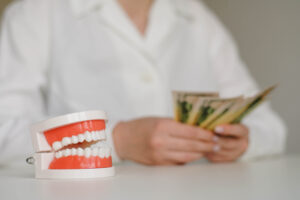Dental anxiety can be a significant barrier to receiving the care you need, but it doesn’t have to be. At Vivid Dental Raleigh, we recognize that many patients experience apprehension about dental visits. Fortunately, there are effective strategies to make your experience comfortable and stress-free.
This comprehensive overview will introduce you to the sedation dentistry options available, enabling you to discover how they can make your next appointment something to look forward to rather than dread.

Understanding Sedation Dentistry
Sedation dentistry involves using medication to help patients relax during dental procedures. Though it’s sometimes termed “sleep dentistry,” most sedation practices do not cause total unconsciousness. Instead, they foster a state of calmness and drowsiness, allowing patients to remain responsive to their dentist’s instructions.
How It Helps Manage Dental Anxiety
Dental anxiety is a common issue that affects millions of people. For some, even the thought of visiting the dentist can trigger fear, leading to delayed appointments or avoidance of dental care altogether. This avoidance can result in poor oral health, which in turn can cause further anxiety due to the need for more extensive procedures down the road.
Sedation dentistry provides a calming solution for dental anxiety. By creating a comfortable, worry-free atmosphere, it helps patients undergo essential dental treatments without the stress or discomfort they might typically face.
Types of Sedation Dentistry Available
Dentistry offers multiple sedation approaches, each intended to match different patient anxiety levels and procedural needs. These include:
1. Nitrous Oxide
One of the most common types of sedation used in dental procedures is nitrous oxide, also known as laughing gas. This mild sedative is inhaled through a mask placed over the nose, and it induces feelings of relaxation and euphoria.
How It Works:
- Inhalation: Patients breathe in the nitrous oxide, which takes effect within minutes.
- Relaxation: It helps ease anxiety and reduce the perception of pain.
- Quick Recovery: Once the mask is removed, the effects wear off quickly, allowing patients to drive home after the appointment.
Nitrous oxide is a great option for individuals with mild dental anxiety or those undergoing routine procedures. It’s considered one of the safest sedation dentistry options and is suitable for both adults and children.
2. Oral Sedation
For patients with moderate dental anxiety or those who need more extensive procedures, oral sedation can be a helpful option. This involves taking a prescribed sedative, usually in pill form, about an hour before the appointment.
How It Works:
- Oral Medication: Common drugs like diazepam or triazolam are used to induce a state of calmness.
- Moderate Sedation: Patients may feel drowsy, but they remain conscious and can respond to instructions.
- Longer Recovery: While patients are awake, the drowsy effects can linger for several hours, so transportation is required.
Oral sedation offers a deeper level of relaxation than nitrous oxide, making it ideal for patients with moderate to severe anxiety. It can also be combined with other dental anxiety solutions, such as local anesthesia, for added comfort.
3. IV Sedation
IV sedation, or intravenous sedation, is a more advanced option for patients with severe dental anxiety or those undergoing complex procedures, such as oral surgery.
How It Works:
- Intravenous Medication: Sedative drugs are administered directly into the bloodstream, offering immediate effects.
- Deeper Sedation: Patients are in a semi-conscious state, meaning they can be awakened but are unlikely to remember much of the procedure.
- Professional Monitoring: Heart rate, oxygen levels, and blood pressure are carefully monitored throughout the procedure.
Since IV sedation requires more preparation and monitoring, it is typically reserved for longer or more invasive procedures. The deep relaxation it provides makes it one of the most effective sedation for dental procedures.
4. General Anesthesia
For the most extreme cases, general anesthesia may be recommended. This involves putting the patient into a completely unconscious state, ensuring they feel no pain and have no memory of the procedure.
How It Works:
- Administered in Hospital or Clinic: General anesthesia is typically reserved for hospitals or specialized clinics due to the need for advanced monitoring.
- Complete Unconsciousness: The patient will be asleep for the entire procedure and will need time to recover afterward.
- Extensive Monitoring: Like IV sedation, vital signs are monitored closely to ensure the patient’s safety.
General anesthesia is most commonly used for complex oral surgeries or for patients who cannot tolerate any other sedation dentistry options. It is not frequently used in general dental practices but is available when necessary.

Who Benefits from Sedation Dentistry?
The benefits of sedation dentistry go beyond just reducing fear and anxiety. It can be a great option for patients who:
- Have a low pain tolerance
- Need extensive dental work
- Have a strong gag reflex
- Have difficulty sitting still for long periods
- Have sensitive teeth
The flexibility of levels of sedation dentistry means that there’s a solution for everyone—from patients needing just a little help relaxing to those requiring complete unconsciousness.
Choosing the Right Sedation: Key Factors to Consider
The decision on which sedation method to use is not one-size-fits-all; it requires careful consideration of several important factors that can enhance your dental experience. Here are the main aspects to focus on:
Level of Anxiety
For patients who experience minor anxiety, options like nitrous oxide or oral sedation are typically effective, while those with heightened anxiety may find IV sedation or general anesthesia more suitable.
Type of Procedure
Routine procedures, such as cleanings or fillings, often only require minimal sedation, while more complex procedures, like root canals or dental implants, may benefit from moderate to deep sedation.
Health Considerations
Your overall health and any medical conditions can influence which sedation methods are safest for you. Discussing your medical history with your dentist will help ensure the most suitable choice is made for your care.
A consultation with our team at Vivid Dental Raleigh will help determine whether sedation is the right choice for you based on your individual needs and preferences.
Combining Sedation with Relaxation Techniques
While sedation dentistry can significantly reduce anxiety, there are also non-medical ways to alleviate fear before and during your appointment. Some practices combine sedation with relaxation techniques like:
- Listening to calming music: Many patients find it helpful to listen to soothing music through headphones during the procedure.
- Breathing exercises: Slow, deep breathing can help regulate your nervous system and reduce anxiety.
- Distraction techniques: Some practices offer televisions in the treatment rooms, allowing you to watch your favorite shows during the appointment.
A well-rounded approach to dental care, combining sedation with relaxation, sets the stage for a positive experience and lasting oral health.

Safety and Risks Associated with Sedation Dentistry
While sedation dentistry is considered a safe option for many patients, it is crucial to have it performed by a qualified and experienced dental team. This important consideration helps to minimize potential risks associated with sedation dentistry, which include:
Allergic Reactions
Although rare, some patients may experience allergic reactions to sedation medications. A comprehensive review of your medical history is conducted beforehand to significantly reduce this possibility.
Over-sedation
While uncommon, there is a small risk of oversedation, particularly with IV sedation or general anesthesia. This is why continuous monitoring of vital signs throughout the procedure is crucial to ensure the correct sedation levels are maintained.
Prolonged Drowsiness
Depending on the type and level of sedation used, patients may feel drowsy for several hours post-procedure. It’s essential to have someone available to assist with transportation and aftercare.
With the proper precautions in place, sedation dentistry remains an excellent option for those seeking a fear-free dental visit.
Say Goodbye to Dental Anxiety—Welcome to Vivid Dental Raleigh!
Experience a brighter smile with Vivid Dental Raleigh, your trusted dental partner in North Carolina! We understand that visiting the dentist can be daunting, which is why we prioritize comfort and personalized attention to make your experience as pleasant as possible.
Our extensive range of services guarantees that all your dental needs are met under one roof. Whether you are looking for general dentistry, cosmetic enhancements, or advanced options, we take pride in our patient-centered approach to help you achieve the smile you’ve always dreamed of.
Don’t let worries keep you away—schedule your appointment with us today!

Conclusion
In your pursuit of a more enjoyable dental experience, exploring the types of sedation dentistry can turn one of fear into one of empowerment. With options tailored to your needs, there’s no reason to let anxiety stand in the way of your oral health.
Contact Vivid Dental Raleigh and join the countless others who have discovered the joys of relaxed visits on their journey to a healthier smile!





